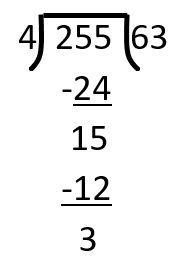
Find the last two digits of ${17^{256}}$.
Answer
588k+ views
Hint: We will break $17$ into two parts ${(10 + 7)^{256}}$. Further we will use a binomial theorem formula to get the desired result.
Formula of binomial theorem: $p(x) = \dfrac{{n!}}{{(n - x)!x!}} \times {(p)^n}.{(q)^{n - x}}$
Complete step by step solution:
The given numbers: ${17^{256}}$
For finding the last two digits we have to find the remainder of ${17^{256}}$.
We will apply binomial expansion ${17^{256}}$.
${17^{256}} = {(10 + 7)^{256}}$.
\[{17^{256}} = {\,^{256}}{C_0}{10^0}{7^{256}} + {\,^{256}}{C_1}{10^1}{7^{256 - 1}}\]
${17^{256}} = {\,^{256}}{C_0}{10^0}{7^{256}} + {\,^{256}}{C_1}{10^1}{7^{255}}$
We will solve this value in two parts
So, ${I_1} = {\,^{256}}{C_0}{10^o}{7^{256}}$ and ${I_2} = $$^{256}{C_1}{10^1}{7^{255}}$
${I_1} = {\,^{256}}{C_0}{10^o}{7^{256}}$
We get last digit by last digit of ${\,^{256}}{C_0}{10^0}{7^{256}}$
We divide of $256$ by $4$

This number is divided completely, so
${7^0} = 1$
${I_1} = 1$
${I_2} = {\,^{256}}{C_1}{10^1}\,{7^{255}}$
$ = \dfrac{{256!}}{{256 - 1!1!}} \times {10^1} \times {7^{255}}$
$ = \dfrac{{256!}}{{255!1!}} \times {10^1} \times {7^{255}}$
$ = \dfrac{{256 \times 255!}}{{255!}} \times {10^1} \times {7^{255}}$
$ = 256 \times {10^1} \times {7^{253}}$
Now, we will complete the power of $255$

\[7 \times 7 \times 7 = 343\], we calculate last digit only
$6 \times 3 = 18$
Here last digit is also $8$
${17^{256}} = 81$
Note: Students should divide the powers of $17\,\,by\,\,4$. If the power is completely divided by $4$ then the answer will be given by ${7^4}$ and if the power is not completely divisible by $4$ then remainder will be left.
Formula of binomial theorem: $p(x) = \dfrac{{n!}}{{(n - x)!x!}} \times {(p)^n}.{(q)^{n - x}}$
Complete step by step solution:
The given numbers: ${17^{256}}$
For finding the last two digits we have to find the remainder of ${17^{256}}$.
We will apply binomial expansion ${17^{256}}$.
${17^{256}} = {(10 + 7)^{256}}$.
\[{17^{256}} = {\,^{256}}{C_0}{10^0}{7^{256}} + {\,^{256}}{C_1}{10^1}{7^{256 - 1}}\]
${17^{256}} = {\,^{256}}{C_0}{10^0}{7^{256}} + {\,^{256}}{C_1}{10^1}{7^{255}}$
We will solve this value in two parts
So, ${I_1} = {\,^{256}}{C_0}{10^o}{7^{256}}$ and ${I_2} = $$^{256}{C_1}{10^1}{7^{255}}$
${I_1} = {\,^{256}}{C_0}{10^o}{7^{256}}$
We get last digit by last digit of ${\,^{256}}{C_0}{10^0}{7^{256}}$
We divide of $256$ by $4$

This number is divided completely, so
${7^0} = 1$
${I_1} = 1$
${I_2} = {\,^{256}}{C_1}{10^1}\,{7^{255}}$
$ = \dfrac{{256!}}{{256 - 1!1!}} \times {10^1} \times {7^{255}}$
$ = \dfrac{{256!}}{{255!1!}} \times {10^1} \times {7^{255}}$
$ = \dfrac{{256 \times 255!}}{{255!}} \times {10^1} \times {7^{255}}$
$ = 256 \times {10^1} \times {7^{253}}$
Now, we will complete the power of $255$

\[7 \times 7 \times 7 = 343\], we calculate last digit only
$6 \times 3 = 18$
Here last digit is also $8$
${17^{256}} = 81$
Note: Students should divide the powers of $17\,\,by\,\,4$. If the power is completely divided by $4$ then the answer will be given by ${7^4}$ and if the power is not completely divisible by $4$ then remainder will be left.
Recently Updated Pages
Master Class 10 Computer Science: Engaging Questions & Answers for Success

Master Class 10 General Knowledge: Engaging Questions & Answers for Success

Master Class 10 English: Engaging Questions & Answers for Success

Master Class 10 Social Science: Engaging Questions & Answers for Success

Master Class 10 Maths: Engaging Questions & Answers for Success

Master Class 10 Science: Engaging Questions & Answers for Success

Trending doubts
What is the median of the first 10 natural numbers class 10 maths CBSE

Which women's tennis player has 24 Grand Slam singles titles?

Who is the Brand Ambassador of Incredible India?

Why is there a time difference of about 5 hours between class 10 social science CBSE

Write a letter to the principal requesting him to grant class 10 english CBSE

State and prove converse of BPT Basic Proportionality class 10 maths CBSE




